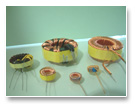
Toroidal choke inductors are a vital component in various electronic circuits, renowned for their efficiency and compact design. Unlike other inductor types, their toroidal (doughnut-shaped) core minimizes magnetic flux leakage, resulting in higher inductance values for a given size and lower electromagnetic interference (EMI). This description explores the different types of toroidal choke inductors, highlighting their key characteristics and applications.
The core material significantly impacts the inductor's performance characteristics. Common core materials include:
1. Ferrite Cores:
2. Powdered Iron Cores:
3. Nanocrystalline Cores:
4. Other Core Materials:
While less common, other materials like MPP (molybdenum permalloy powder) cores are used in specialized applications where specific magnetic properties are required.
Beyond core materials, toroidal choke inductors vary in their construction and mounting styles:
Selecting the appropriate toroidal choke inductor depends on several factors: